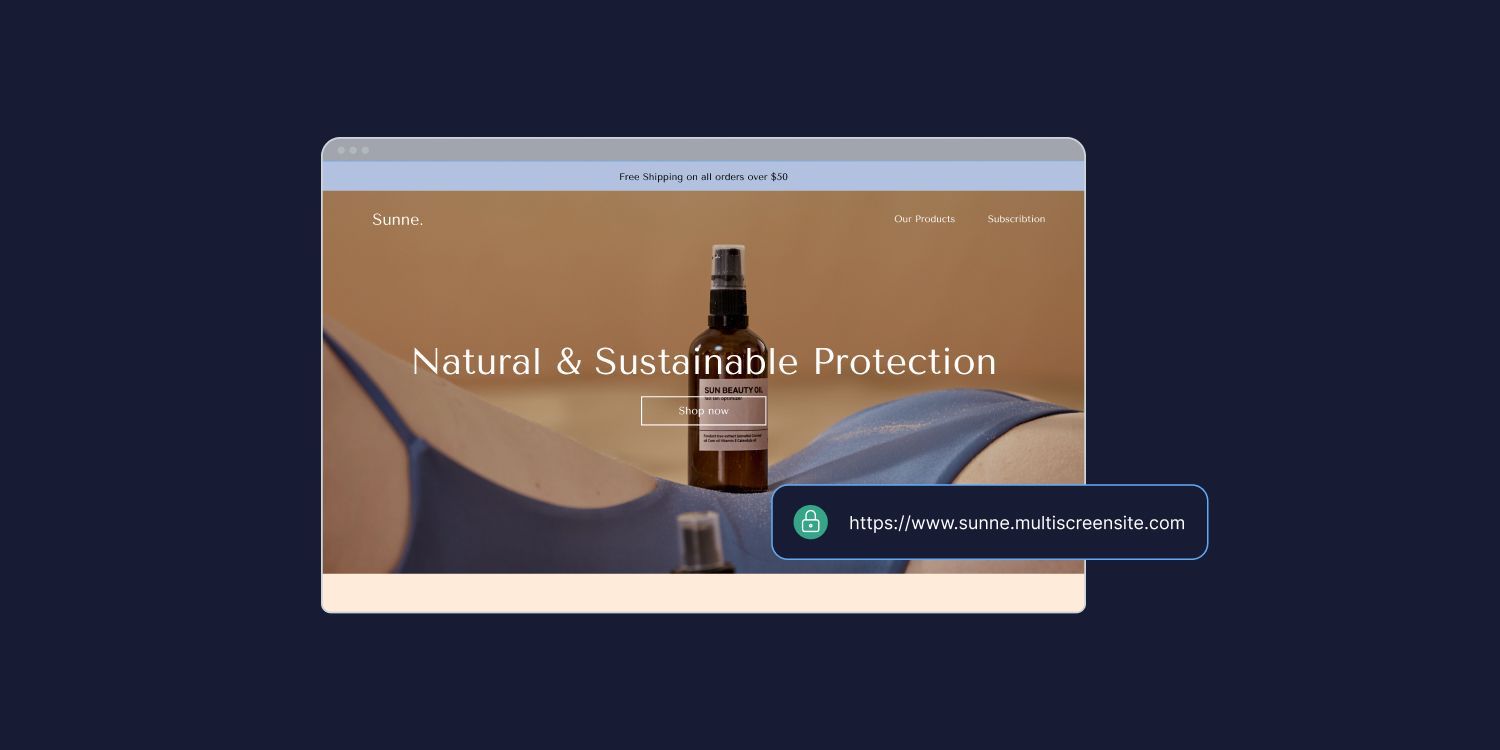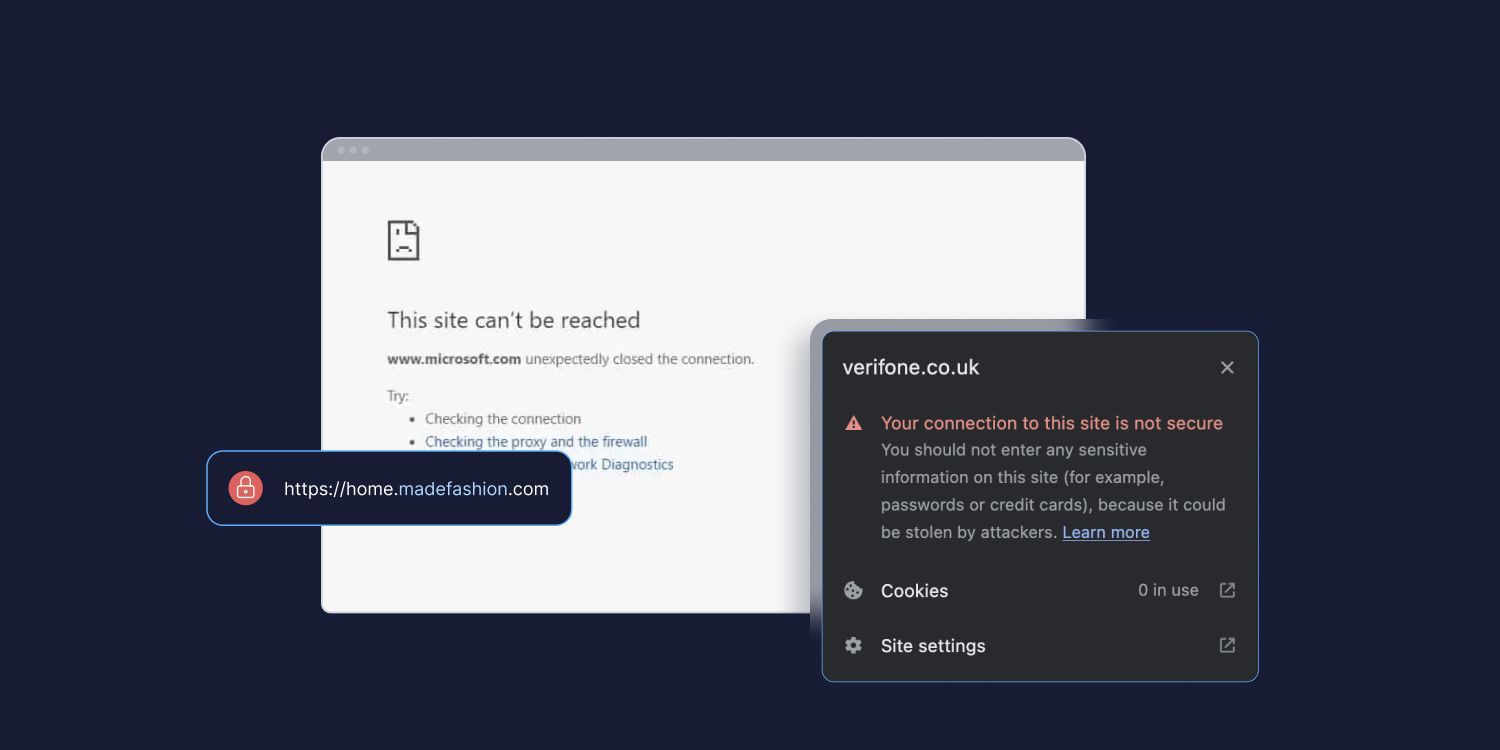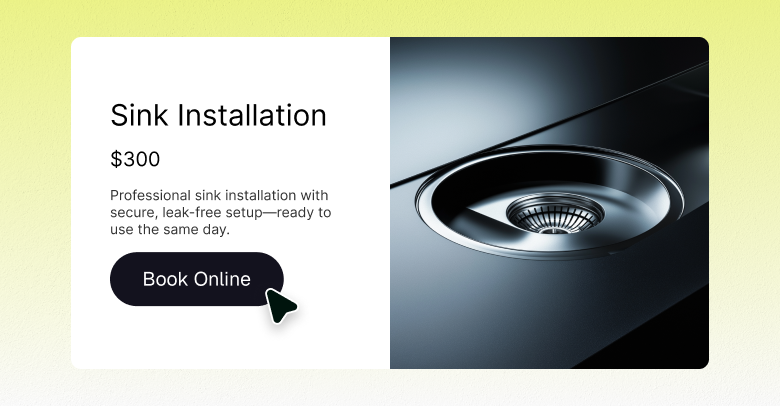SSL certificates are the de facto standard for deploying secure
eCommerce sites. They protect customer data, ensure network security, and authenticate a website’s identity. Plus, they're a requirement for most web browsers—including Google Chrome and Mozilla Firefox.
In 2022, data breaches cost companies an average of
$4.35 million. And for consumers, compromised personal information, identity theft, and fraud all become risks.
More than half of consumers have been victims of a cybercrime, and the FBI has reported a 300% increase in cyberattacks since the start of the COVID-19 pandemic.
eCommerce transactions require customers to input sensitive data, like credit card information, shipping addresses, contact information, and date of birth. Hackers know this—online retailers are among the most highly-targeted organizations.
As an agency owner, it is your responsibility to protect your clients' customer data.
WHAT IS DATA ENCRYPTION & HOW DO YOU KNOW A WEBSITE IS SECURE?
Now, we aren’t really discovering America here, but for the sake of keeping things fresh, here’s a crash course on website data encryption.
If a website has SSL encryption, you'll see a small lock icon next to the URL, along with “https.”
When you click on it, it will show you that the certificate is valid and the connection is secure.
If your connection is unsecured, you'll know (and so will your clients’ customers). If they're even allowed to navigate to your website (some browsers automatically prohibit this), you'll see a triangle with an exclamation point inside instead of the lock icon, and the URL will start with “http.”
To investigate your client's site more closely, click on the icon, and you'll see a red message that reads, "Your connection to this site is not secure."
How Does an SSL Certificate Work On A Website?
SSL (Secure Sockets Layer) is a security protocol that provides encryption and authentication for websites. SSL certificates use encryption algorithms to scramble communication between computers, making it almost impossible for hackers to intercept data.
When your clients’ customers see a website with SSL encryption (denoted by HTTPS and a green lock icon in the address bar), they know that their data is secure.
Think of SSL certificates as electronic passports for websites—they validate the website’s identity and ensure data is encrypted before it’s transferred.
By setting up SSL for your clients' sites, you can help ensure the security of their eCommerce transactions and protect their customer data from cybercriminals.
SSL VS. TLS
SSL and TLS (Transport Layer Security) are both security protocols used to encrypt data and authenticate websites.
The two are often used interchangeably. But technically speaking, SSL is an older version of TLS. TLS 1.2 is the current standard for website security and encryption, and establishes a more secure connection than other cryptographic protocols.
Your certificate supports both the SSL and TLS protocols. There is no separate SSL or TLS certificate, and no need to replace an SSL certificate with a TLS one.
WHAT ARE THE BENEFITS OF AN SSL CERTIFICATE FOR ECOMMERCE?
SSL certificates offer numerous benefits for eCommerce platforms. Most importantly, they protect customers' data from being intercepted or stolen.
SSL certificates also:
- Provide authentication and identity verification of the website
- Assure customers that their information is secure
- Increase
search engine rankings (Google favors HTTPS websites)
- Enhance trust and credibility in the eyes of customers
- Boost the number of online purchases
- Improve overall site performance by ensuring data is encrypted
The 5% boost in SEO rankings might not seem like it means much, but it could be the difference between page one and page two for your clients' most competitive keywords. And if your clients’ customers aren't comfortable making online transactions, you're guaranteed to miss out on tons of sales.
SSL certificates give customers peace of mind and the confidence that their data is secure—potentially increasing your clients' conversion rates and revenues in the long run.
TYPES OF SSL CERTIFICATES FOR ECOMMERCE WEBSITES
eCommerce business owners have a couple of different options regarding SSL certificates. Each serves a slightly different purpose, so it's important to choose the right one for your client's web pages. Keep in mind, though, that most of the time, a renewal of an SSL certificate will cost you.
Data suggests that the average cost is about $60 per year, however the cost range can vary and come up to a whopping $1000 yearly–it largely depends on your clients’ site requirements.
Domain Validation SSL Certificate
A domain validation (DV) SSL certificate is the most basic type of SSL certificate. Best for blogs, business websites, and small-scale eCommerce stores that don't store any information, DV certificates are quick to deploy.
Authentication for a DV SSL requires a phone call or email to the website owner. It is the least expensive certificate to get, but it won't help you if your client's website collects personal data.
But if all you need is an HTTPS layer and padlock, this is your best option.
Organization Validation SSL Certificate
An organization validation (OV) SSL certificate is a better option for eCommerce businesses that take customer information. It offers more customer trust and credibility than a DV SSL, since you're authenticating the website's identity before granting the certificate.
To obtain an OV SSL, the certificate authority verifies the ownership of the business and website by requesting business documents, bank statements, and domain information from the provider. Once the investigation is complete, the certificate will appear in the browser's address bar.
Extended Validation SSL Certificate
Extended validation (EV) SSL certificates are the most secure option for eCommerce stores. This type of certificate requires a rigorous authentication process that verifies the website's identity along with its legal and physical address.
EV SSL certificates provide customers with additional security, since they must undergo an extensive review before approval. They also display a green address bar icon, building immediate trust with users who want to know they're using a secure site.
Wildcard SSL Certificate
Wildcard SSL certificates are a type of SSL certificate that uses a wildcard character (*) in the domain name field. This enables the certificate to provide HTTPS encryption and authentication to a website and all its subdomains under the same base domain.
Doing so safeguards visitors' valuable information sent to or received from the primary domain or any subdomains of a website.
Suppose you own
duda.co, and you want to secure your website by encrypting it. But you also want to ensure that the subdomains
blog.duda.co and
university.duda.co are secure.
A wildcard SSL certificate enables you to secure all three domains and any other subdomains you might have.
How to Set Up an SSL Certificate
Many times, you have to set up an SSL certificate manually for your clients’ sites —and it can be quite a burdensome process. In a nutshell, there multiple steps to setting up an SSL certificate for a website – and the further you are in the process, the more tech-savvy you have to be.
The good news is that when you build eCommerce websites for your clients using Duda website builder, the SSL certificate is free. Plus, it’s
automatically generated (it’s a matter of clicking on “Generate Certificate” after publishing a site) and renewed so you don't have to go through the massive pain of doing it manually.
To illustrate, here’s what you might find yourself doing if you want to get an SSL certificate for an eCommerce website, built outside of Duda:
First, you’ll need to choose a Certificate Authority (CA), which will validate your domain and issue the certificate. Popular CAs include DigiCert, Let's Encrypt (our partner), GlobalSign, and Sectigo.
Then, you’ll need to pick the right SSL certificate type from the key ones we mentioned above. Afterwards, generate a Certificate Signing Request (CSR) from your web server. The next step is to submit CSR to the Certificate Authority. This can take anywhere from a few minutes (DV) to several days (EV) since the CA needs to validate your information and domain ownership, which you provide them.
Once you’ve completed the first steps, it’s time to dive deep into the technical part of it, where you install and configure the SSL certificate on your web server. You’ll need to download the certificate files, install them on your server, update your website's internal links, assets, and sitemap to use HTTPS, update 301 redirects and your HSTS, and test everything.
Duda website builder saves you all of this hassle because we believe that once you build a website, your data is private and you should not pay extra in time or money to make websites more secure.
CONSEQUENCES OF NOT HAVING AN SSL CERTIFICATE ON YOUR CLIENT'S ECOMMERCE SITE
If your client's eCommerce site does not have an SSL certificate, they could face several negative consequences that could impact their business's security, reputation, and overall performance.
- Decreased trust and user confidence
- PCI compliance issues
- Increased vulnerability to hackers and malicious attacks
- Possibility of Google search engine ranking penalties
- Inability to process payments securely
- Browser warnings and blocked access
- Reduced conversion rates and sales
If your clients are missing SSL certification, it's one of the easiest
website
improvements to make for increased security and improved performance!
FINAL THOUGHTS
Your clients eCommerce websites need SSL certification. And if they are unaware of that, there's your chance to provide immediate value.
SSL certification is an essential part of website security and could have a huge positive impact on their business.
Getting started with setting up SSL certificates can be quite a story if you opt for a manual installation (but, as we’ve mentioned, you have options), but this small fix will dramatically help your clients' conversion rates, site rankings, and user experience.
Related Posts
By Stephen Alemar
•
February 10, 2026
Discover the best eCommerce solution for your SMB clients Learn key criteria and compare platforms like Duda, Shopify, and BigCommerce to find the right-sized fit.
By Renana Dar
•
May 5, 2025
Many SMBs still hesitate to embrace eCommerce. As the agency partner, you have the opportunity to tear down the perceived walls of eCommerce and show clients how eCommerce can make their business more efficient, accessible, and profitable.
By Shawn Davis
•
October 15, 2024
With the holiday shopping season just around the corner, there’s never been a better time to focus on increasing your clients’ conversion rates. Uncover a few easy strategies you can implement today to do just that.
Show More














